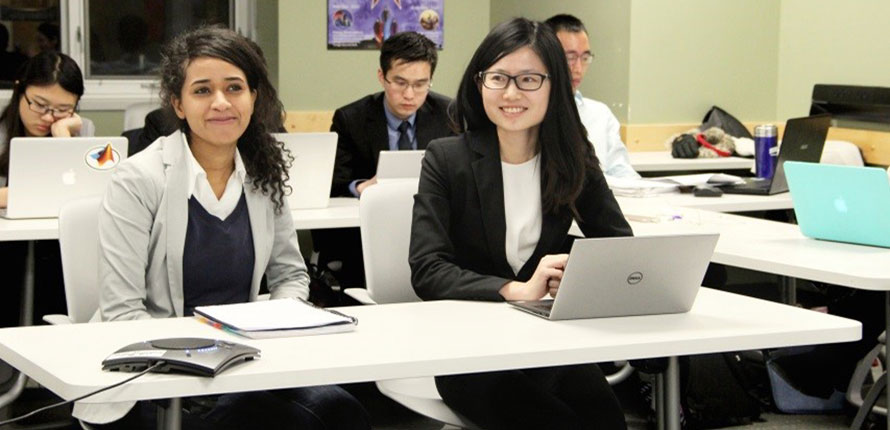We use cookies on this site to enhance your experience.
By selecting “Accept” and continuing to use this website, you consent to the use of cookies.
Search for academic programs, residence, tours and events and more.
Feb. 22, 2018
Print | PDFAt Laurier, peer involvement and hands-on experience play an essential role in creating a holistic educational experience for students. In 2016, six Master of Finance (MFin) students devised a plan to put their education into practice and created the university’s first investment fund run by graduate students—the Laurier Graduate Student Investment Fund (LGSIF). An idea that the faculty at Laurier supported fully.
To bring their idea to fruition, the students first had to raise capital. So they pitched the LGSIF idea to students, alumni, and faculty, and piqued enough interest to succeed in raising seed investment capital. The Dean of the Lazaridis School of Business & Economics, Micheál Kelly, doubled the seed capital to help get the Fund rolling.
For the Fund’s founders, alumni, faculty, and the Lazaridis School as a whole, it was an exciting endeavour. “I knew I had to be involved,” says Harrison Nie, Lazaridis MFin alumnus and manager of trading floor risk management at Scotiabank. “I felt that donating to the fund and providing guidance based on my experience was critical to continue to make this opportunity a reality for students.”

The result of this collective effort was an opportunity created by a community of like-minded students—for themselves and for future generations of students—to put their knowledge into practice by immersing themselves into the real world of hiring, managing, investing, and growing a fund.
LGSIF faculty supervisors hire students to fill three key roles:
As a result, the LGSIF provides a non-linear path from text book tools to real-life high-stakes investing. It provides a platform for students to evolve their classroom skills by applying and honing them in a real investment situation before embarking on their post-education career aspirations.
Michael Ford, student in the part-time MFin program in downtown Toronto and analyst, global optimization for Manulife Asset Management, credits LGSIF for adding value to his education: “Being able to contribute to and manage a real portfolio is one of the highlights of my Master of Finance experience.”
The vision for LGSIF is foremost to provide MFin students with valuable insights and hands-on skills application above the confines of a traditional classroom- and lab-only approach. Advisors and mentors from the investment world visit the School regularly to speak with MFin students and, often host private roundtable discussions. In 2017, Michael Lee-Chin, founder and chairman of Portland Holdings, Inc., Canada’s 20th richest person, was one of them. He invited LGSIF members to a private discussion and shared his investment philosophy.
Growing the Fund’s asset base is a priority. To do this, the student-run LGSIF team has two goals: (1) achieve good investment return to grow the fund, and (2) solicit more donors to contribute to the Fund’s base. The larger the Fund, the more deeply students can explore investment opportunities. In sum, success drives more opportunity.
“Employers are very curious about my role in this Fund,” says Jiaxun (Emily) Zhang, current MFin student. “Through my work on it, I can speak to excellence in a number of skills: equity valuation, risk analysis, communication, leadership, and sales.”
Today, the Fund is 100 per cent student-run and co-supervised by a faculty member and a professional fund manager. It follows a thorough investment strategy and focuses on small cap stocks—the hidden gems that require impeccable due diligence and rigorous research to uncover.
Tony Tang, associate professor of Finance and director of the Master of Finance program at the Lazaridis School says, “With real capital at stake, the risks are real. Which means our students have a unique opportunity to put their formal education to work.” He adds about results: “Many have credited LGSIF for providing enriched skillsets and thus better employment opportunities long term.”